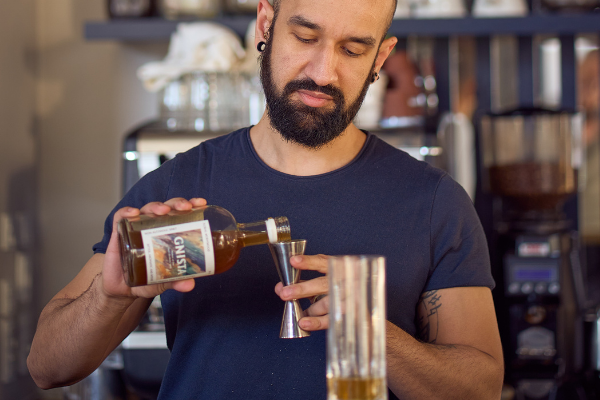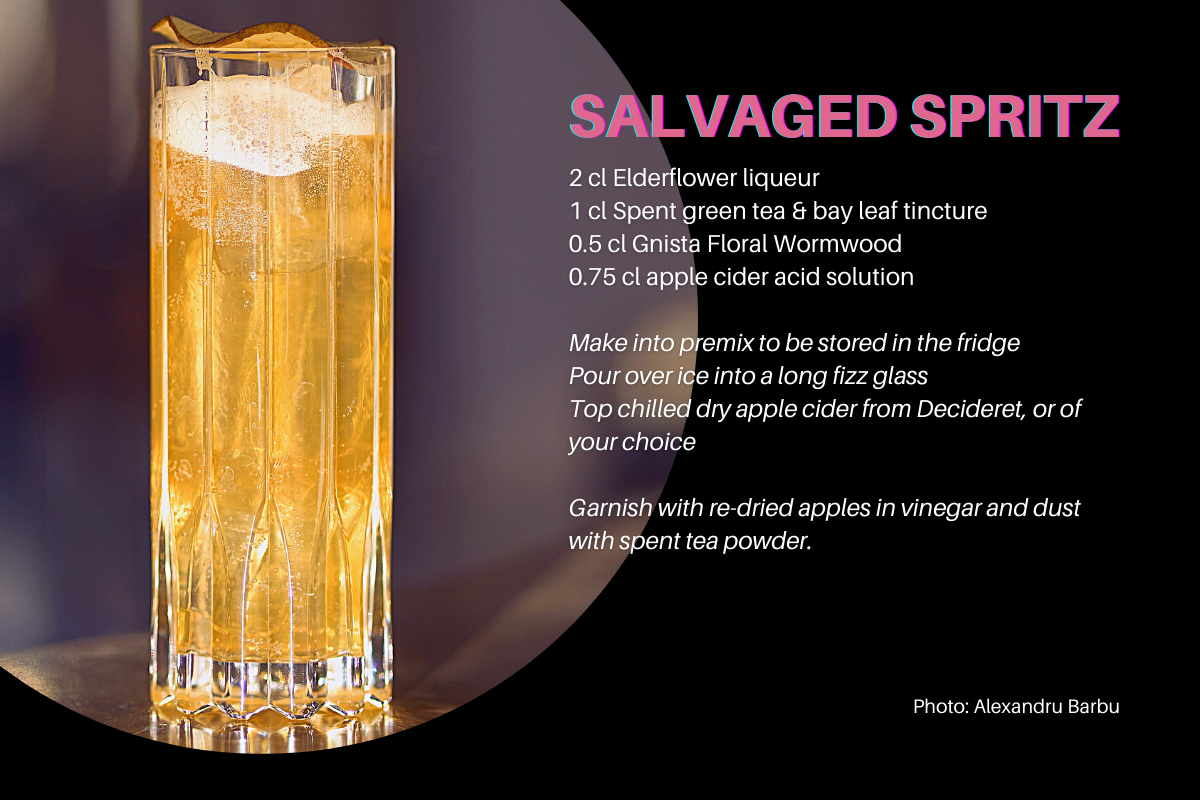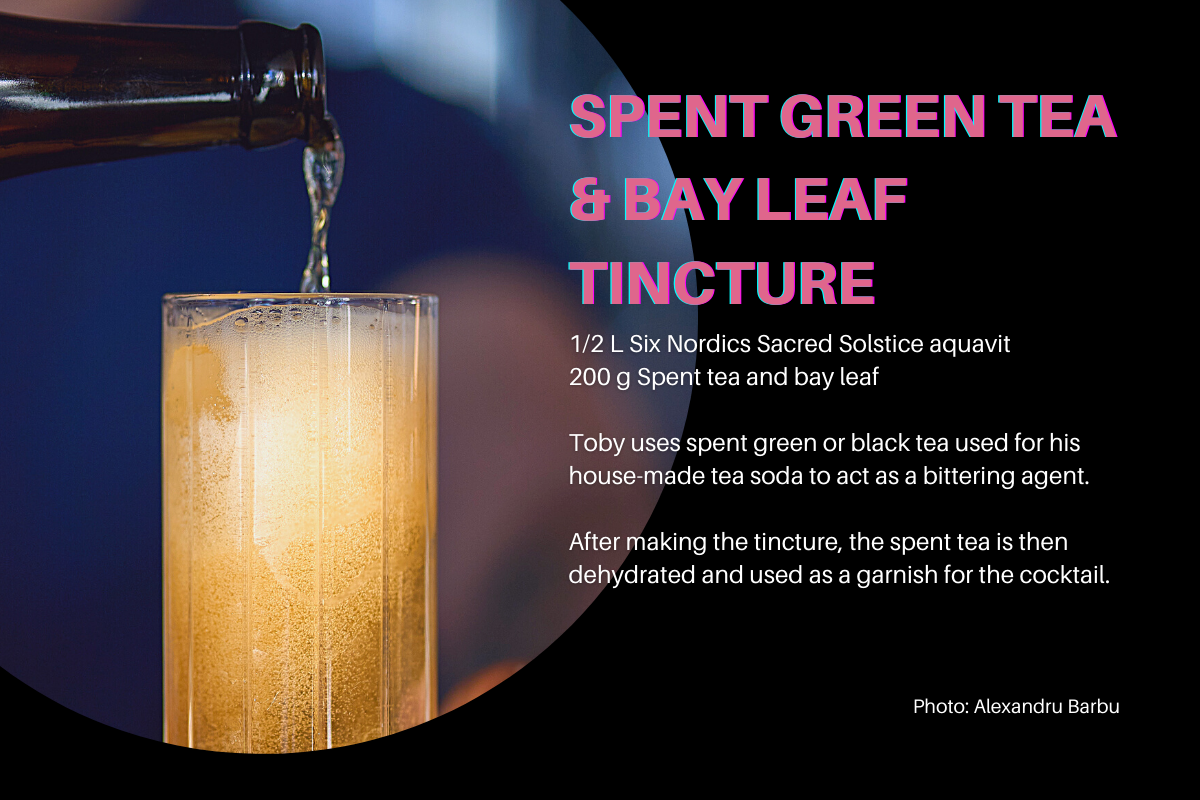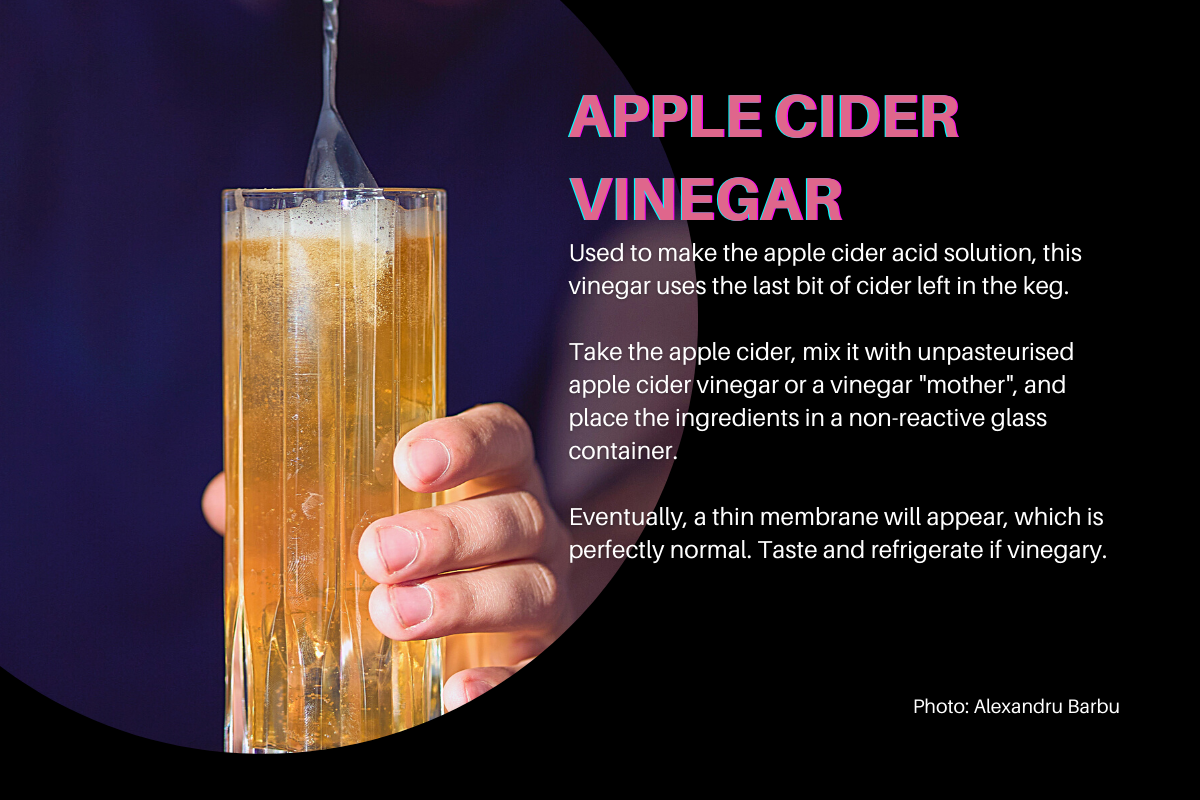“Every bar in Copenhagen is doing something to minimise food waste if we can get around it,” says bartender and spirits producer Toby Efteland. The question is: are they doing enough? Photos by Alexandru Barbu.
Photos by Alexandru Barbu.
Food waste is one of the key factors driving climate change. And with the COP26 coming up this year, it is no surprise that both the Danish government and a number of Danish companies and startups are actively taking the initiative to minimise food waste.
In 2015, the Danish service sector produced an estimated 277.000 ton of food waste, according to the Danish Ministry of Environment. Whilst the study didn’t provide any information on wastage by bars, it was estimated that hotels and restaurants alone were responsible for 29.000 tons. In 2020, food waste accounted for 3.8% of Denmark’s total CO2 emission.
Whilst guests are getting used to ferments and surplus serves at Michelin-star restaurants, when it comes to cocktails, there is a lingering notion that quality equals fresh. After all, how can our trash be high-end? At ARK, Copenhagen, the first-ever 100% plant-based fine dining restaurant in Denmark, the bar might have the answer.
“Sustainability is part of the main concept for the venue,” explains Toby Efteland, bar manager for ARK. Brought in to accommodate the cocktails of the bar to the dining experience, Toby is working with smaller serves and flavour pairings. But more importantly, he is working with using what is already at hand, turning kitchen surplus into the raw material of his cocktail creations. “As much as possible, open-loop recycling is part of creating the cocktail menu, for example by taking coffee grinds and making our own coffee liqueur, or using old, oxidised wine for syrups or new ferments,” he explains. “We see what we have and how we can adapt it to the cocktail we want to create.”
Pandemic: the perfect time to innovate
In the aftermath of coronavirus, bars struggle to not just regain their financial footing, but also find the optimism to keep pushing on. As such, it is unlikely that beverage managers and head bartenders are dedicating time in lockdown to stitch together a grand plan for minimising food waste in their venues. But, if we are to restore resilience and optimism within the industry post-lockdown, perhaps this is exactly what needs to be done.
There’s a trend for trash, and it’s about to know new heights. Now, when there is actually the time for it, bars should get ahead of themselves on testing new practices that will level the public’s opinion about the bar industry post-lockdown, as well as motivate staff to stay productive and creative.
Creating a circular economy within the four walls of the bar.
In an article for bar & expo, Trash (formerly TrashTiki) founders Ian Griffiths and Kelsey Ramage bluntly acknowledged that it is impossible for bars to become zero-waste. Rather, the goal should be to become “anti-waste”, meaning that every initiative should be done with the aim to improve standards and practices in the bar.
For venues looking to minimise food waste, it’s often a question of first looking at what foods are being wasted and why, and then retrace one’s steps to understand what can be done differently.
Replacing juices with homemade acid mixes is a well-known example of sustainably bringing acidity into drinks. However, if bars prefer to stick with fresh fruit, even then, “basic sustainability is quite easy,” says Toby. “For example, if you insist on using fresh lemons to make juice you might as well use the skins and turn them into syrups or Saccharum rather than just throw them out.”
Keeping reduce, reuse and recycle in mind, bars will be able to redesign practices before, during and after service to minimise both food and financial waste. “It can be expensive if you want to start something from scratch,” says Toby. “At ARK, we begin with the classic cocktails containing at least three ingredients, look at what we have and then work on adapting it to the cocktail we want to create,” he explains. This includes using the last bit of an empty cider keg to make vinegar or extracting the remaining flavour of spent tea to create a tea soda.


 The key then lies in lowering the cost of production by more intelligently utilising input and ingredients. And this where bars can have fun, challenging their staff’s creativity towards anti-food waste practices and generating curiosity and innovation.
The key then lies in lowering the cost of production by more intelligently utilising input and ingredients. And this where bars can have fun, challenging their staff’s creativity towards anti-food waste practices and generating curiosity and innovation.
Looking for help and collaborations beyond our industry.
The use of local and seasonal ingredients is no longer just an option for bartenders in Denmark - it has become a habit. Many bars, such as Gedulgt in Aarhus, are already actively foraging throughout the year and they base their menus around seasonality for the sake of both flavour and sustainability. And with the number of Danish distillers and brewers continuing to grow, the spirit shelves too have come to be more localised. But what untapped opportunities might we find in our local communities if we look beyond the cocktail and spirits industry?
Thanks in part to private and public investments supporting food tech innovations, the Danish startup scene is ripe with sustainability-focused businesses and communities. An example of this is BRØL, a non-profit beverage manufacturer that collaborates with a number of cafes, restaurants and takeaway joints to brew beer from their surplus food.
Another community-driven startup, Eat Grim, could also provide inspiration for bars. The start-up works with farms from Denmark and beyond to collect the “ugly” vegetables that supermarkets aren’t interested in and then resell them to private consumers in weekly fruits and vegetables subscription boxes.
What if bars tapped into the same resources as BRØL and Eat Grim, altering their supply chain to directly minimise food waste? Arguably, if we start perceiving local cafes, restaurants, shops and farms as an open surplus market, innovation would also escalate. Bartenders would be forced to not only develop their techniques but also to take a holistic approach to ingredients and cocktail making. Challenging bars and staff to become even more innovative about anti-food waste practices will drive curiosity and educate talent.
But, “it takes training and it takes time, and that’s what a lot of bars don’t have,” says Toby. Bars are often understaffed, and staff are often responsible for undertaking several tasks that would normally be delegated between two or three positions in a kitchen. Needless to say, if a bar is to make a true commitment to minimising food waste, then education, a change of practices and a reorganisation of prep must be worked into the weekly schedule. However, joining online communities sharing sustainability tools and knowledge is an efficient way for bars to shortcut the process of researching new practices and educating staff. If the knowledge is already out there, then it’s simply a matter of whether bars intend to tap into it or not.
Education goes even beyond the bar.
The main challenge then might still lie in getting the guests onboard. Back at ARK, Toby believes that in spite of the push created by the New Nordic movement, New York and London bars are more progressive and innovative than Danish bars because they have a more open-minded clientele. “If you have a funky concept or a vegan concept like ARK, your clientele is generally more open to new experiences. But, even though consumers are increasingly demanding sustainable practices, when it comes to cocktails, “the Danish clientele is still a little more reserved,” Toby believes.
And so, for Danish bars to become successfully anti-waste, we must challenge the lingering notion that in cocktails, fresher ingredients means better quality. Both within our own community but more importantly through educating our guests. By being open and transparent we can begin to connect with the community surrounding the bar over sustainability practices.
And here are the good news: the definition of what is sustainable is constantly developing. We in the bar industry are part of the problem, but if we continue to review and reflect on our work, we might end up discovering the solution.
